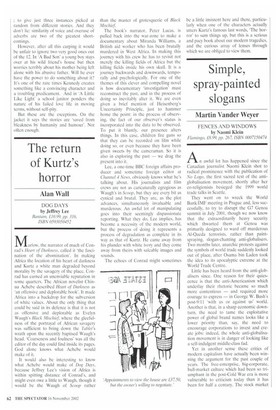A damned dark dozen
Sam Phipps
INDELIBLE ACTS by A. L. Kennedy Cape. £12. (19, pp. 212. ISBN 022406259X Indelible Acts is A. L. Kennedy's first book of fiction since Everything You Need, which was followed by a spell of suicidal desperation. We know all about that from On Bullfighting, her patchily received foray into the world of the matador which was only partly about matadors and partly about herself and her suicidal desperation.
With fiction it's different, of course; you're not supposed to confuse author and content or to assume any link. Still, whatever the state of Kennedy's mind and emotions now, the predominant quality of these 12 stories — the common denominator — is, sad to say, gloom. And not always an interesting gloom at that. The Kennedy gloom tends to have a deep-seated, almost predetermined feel that makes it very hard to shift, let alone see through. It infects all her characters almost all of the time and comes across not so much as an absorbing trait as a giant attitude problem.
This has two main drawbacks. It makes it hard to care for these people — why should we? — and, perhaps more importantly, it robs them of any possibility of transformation or redemption that could give the stories some texture and depth. It's not grinning angels we're after but just something approaching credible, up-anddown human beings. Or failing that, a genuine sense of tension or pain or absurdity; anything but this terminal ennui.
A loose theme is the impossibility of successful relationships, marital or extramarital. But such an air of resignation pervades these tales that it's a wonder anyone even has the energy to try. The sex, perhaps intentionally, is low on excitement. The dialogue is mostly rather hammy. And though the settings vary from rural and urban Scotland to Rome to Lucerne, the US — or is it Canada? — and beyond, there's little impression of physical place.
The misery, the misery. She grimaces back, not entirely unhappily ..."So I don't hate the role, not entirely ...When Greg noticed he was hungry, he stopped in a small, rain-shuttered town and ate lunch in a gift shop café. The food was dreadful ...'
; to give just three instances picked at random from different stories. And they don't lie: similarity of voice and overuse of adverbs are two of the greatest shortcomings.
However, after all this carping it would be unfair to ignore two very good ones out of the 12. In 'A Bad Son' a young boy stays over at his wild friend's house but then worries terribly about his mother being left alone with his abusive father. Will he ever have the power to do something about it? It's one of the rare times Kennedy creates something like a convincing character and a troubling predicament. And in 'A Little Like Light' a school janitor ponders the nature of his failed love life in moving terms, without self-pity.
But these are the exceptions. On the jacket it says the stories are 'saved from bleakness by humanity and humour'. Not often enough.



























































































 Previous page
Previous page